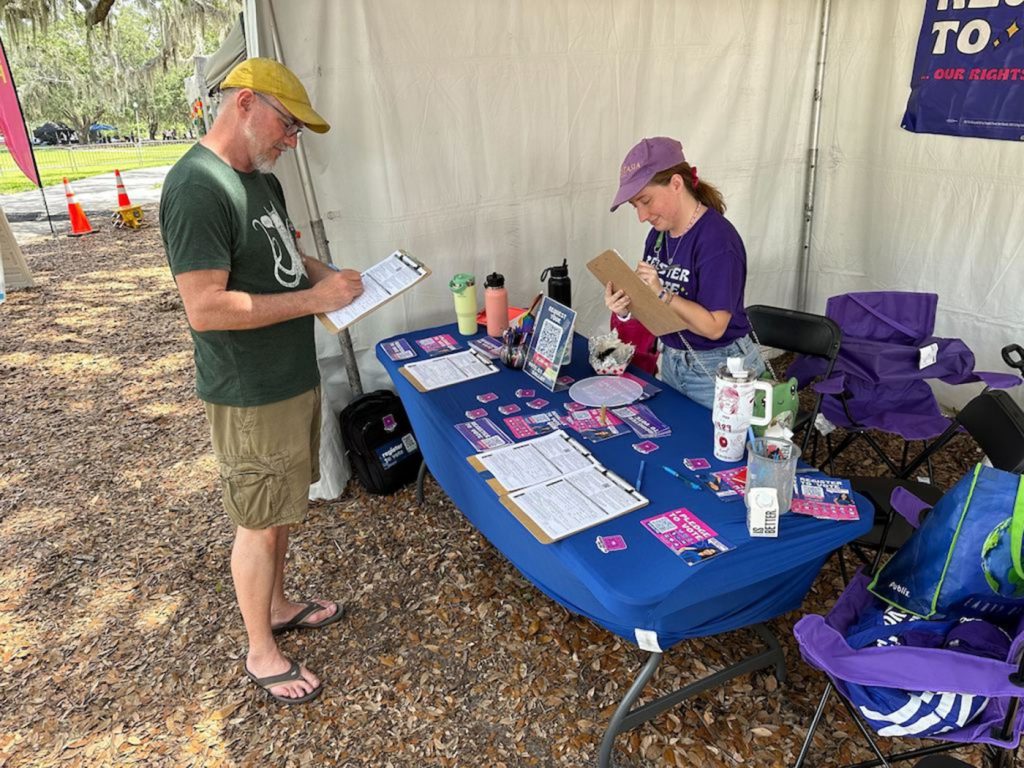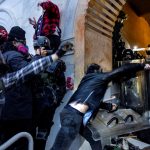Matt Vasilogambros | (TNS) Stateline.org
ORLANDO, Fla. — On a sticky Sunday afternoon in late May, Mark Wendell ambled through Loch Haven Park, a mossy, oak-covered green space wedged between a trio of lakes and the Orlando Science Center.
Among the two-dozen food and vendor tents lining the sidewalks at the Orlando Fringe theater and arts festival was People Power for Florida’s table, cluttered with voter registration forms, stickers and about 50 mismatched pens.
As Wendell, wearing flip-flops and a baseball cap, walked by, he noticed the civic engagement group’s purple “Register to Vote” sign.
“Are you registered to vote?” asked Roxanne Perret, one of the four organizers at the white tent, holding a clipboard and raising her voice over a nearby funk band.
“I am,” he said, “but in another state. I just moved here.”
After Wendell, 62, finished filling out the form, Perret recited a well-rehearsed disclaimer: She would turn in the paper to Orange County’s supervisor of elections within 10 days. He should get his new voter ID in the mail within 30 days.
Perret also handed him a slip of paper with her name and her group’s state registration number — an official receipt that is now required by law.
Without it, the organization could have been liable for hundreds of dollars in legal penalties under a law that Florida passed last year.
Republican lawmakers here and in Alabama, Georgia, Kansas, Missouri, Montana and Texas have enacted a variety of voter registration laws over the past four years. The measures add new requirements around registering and communicating with voters and threaten hefty penalties for violations.
The stated goal of the new laws is to prevent fraud, but some voting rights groups contend their real purpose is to dampen participation by likely Democratic voters.
“It’s a huge chilling effect on the organizations who are doing this work, and on voters,” said Jonathan Diaz, director of voting advocacy and partnerships at the Washington, D.C.-based Campaign Legal Center, which has led lawsuits on behalf of the League of Women Voters chapters and other groups in Florida, Alabama and Missouri.
Diaz thinks the recent state restrictions are a response to robust registration efforts during the COVID-19 pandemic, which contributed to one of the highest turnouts in a presidential election in decades.
For a century, third-party voter registration groups have been a mainstay in broadening participation in the American political system, seeking out potential voters at festivals, parades or outside grocery stores. These efforts date back to the women’s suffrage movement, and many groups played a pivotal role during the Civil Rights Movement.
Over the past five years, more than 350 groups have signed up as third-party voter registration organizations with the Florida Division of Elections, including county political parties, individual residents, candidates, and religious and social groups.
Many whose focus is on young people or historically marginalized communities say they’ve had to change their operations to avoid fines or felony charges. Some have stopped registration drives altogether.
However, not every grassroots group finds the state law burdensome.
Seeing a gap in registration efforts for Republican voters, Barbara Casanova last year launched Citizens First, a Miami-based nonprofit that also helps people run for office.
The state law means extra costs for printing receipts, and she has some concerns about vague language in the statute, but her father — the highest-ranking Cuban American in President Ronald Reagan’s administration, according to her biography — always told her the GOP had two missions: Grow the party and get good people elected.
“It’s one of the prices we pay to be able to carry out our civic duty,” said Casanova, who serves as Citizens First’s president. “I think it’s worthwhile.”
‘Those fees can stack up’
Under the Florida law, third-party voter registration groups that employ noncitizen volunteers are subject to a $50,000 fine for each one — even those with green cards. They also are barred from using volunteers with certain felony convictions on elections-related charges, or for crimes such as fraud, forgery or perjury.
The state can fine groups as much as $2,500 for each voter registration application that is turned in late. There are fines for turning in forms to the incorrect county. Total annual fines could reach $250,000 per organization. It also is a felony to hold on to registrants’ personal information for future outreach or other purposes.
Last month, a federal judge ruled it was unconstitutional for Florida to ban noncitizens from registering people to vote — finding the effort discriminated against Latino outreach — and blocked the state from enforcing the ban. Still, voter registration groups remain under immense pressure, said Democratic state Rep. Anna V. Eskamani, the founder of People Power for Florida.
“Those fees can stack up a lot more aggressively and just bankrupt your organization,” Eskamani said in an interview a week before the Orlando event.
Last year, the state fined her group $2,000 for missing a registration deadline to turn forms in for the August primary. But Eskamani called the fines “silly,” arguing those voters weren’t planning on voting until November. The state also fined People Power for Florida $3,000 for filing forms with the wrong county; the group said the state had made a mistake, and the fine was rescinded.
“Every day, I’m bracing for some sort of incorrect and burdensome fine,” Eskamani said.
Other Florida-based groups have had to reconsider whether it’s worth the fines or possible criminal penalties to conduct voter registration drives anymore.
The nonpartisan League of Women Voters of Florida, for example, decided last year to stop registering voters using paper applications for the first time since the organization began such efforts a century ago.
To avoid legal liability, the league instead directs potential voters to scan a QR code with a smartphone and register on their own. The league has spent thousands of dollars on mobile hot spots so festivalgoers can use the internet at the league’s booths.
“All of these penalties and prohibitions and difficulties and threats to us have just been extremely painful,” said Cecile Scoon, the Florida league’s co-president. “Under the latest set of laws, which are just so ruinous and prohibitive, we’ve had to protect our members and protect the league.”
The state’s new cap, now raised to a quarter of a million dollars in maximum yearly fines, is basically the group’s annual budget, she said.
For 70% of the 110 or so small, grassroots organizations in the state receiving resources and training from the national advocacy group Black Voters Matter, the new law has pushed them to stop voter registration drives, said Jamil Davis, the nonprofit’s Florida state organizing manager. He said the law is working as intended.
“People who support this bill think, ‘We get enough Black and brown voters out of the way for this election, it gives us a better opportunity to continue being in the seats that we’re currently in,’” Davis said.
He pointed to a 2021 report from Daniel Smith, a professor of political science at the University of Florida, which showed that Black and Latino Floridians are five times more likely than white residents to register to vote through a third-party voter registration organization.
Overall, more than 760,000 Floridians had registered to vote through these groups, according to the report. Smith, the chair of the university’s political science department, wrote it on behalf of voting rights groups during a court case over a separate bill Florida Republicans passed in 2021. That law added fines for returning forms late to election offices.
Behind the GOP effort
Republican lawmakers argued that Florida’s 2023 law was necessary to protect voters who trust outside groups to safeguard their personal information and submit their applications on time.
“Every cycle … there’s additional issues that arise with these organizations, which is prompting the additional need for enhanced measures of protection,” Republican state Sen. Danny Burgess, who chairs the Ethics and Elections Committee, told a local NBC affiliate in south Florida in April 2023, after he and his colleagues passed the measure.
Officials in the office of Florida Republican Secretary of State Cord Byrd declined an interview request, and instead pointed to its January report describing problems that “have plagued the state for years.” The report outlines how groups have at times altered political parties on registration forms without consent, registered dead or fake people, or forged application dates to avoid fines.
In April 2023, after the law passed, Byrd announced$34,400 in fines against Hard Knocks Strategies, a Democratic political strategy firm and third-party voter registration organization. Byrd said the firm showed “blatant disregard” for state laws by failing to return voter registration applications on time or to the correct county. The fines coincided with criminal charges against several members of the group on suspicion of turning in fraudulent applications, which have led to prison sentences.
Republicans in other states have cited similar fraud concerns when enacting voter drive restrictions.
In March, Alabama Gov. Kay Ivey, a Republican, signed into law a measure that in part makes it illegal for groups to pre-fill a voter’s name or other information on an absentee ballot application. It also is a felony subject to 10 years in prison for someone to be paid by a group to assist voters with absentee ballot applications.
The Campaign Legal Center, along with the League of Women Voters of Alabama and a coalition of other voting rights and disability access groups, sued the state in April to block the law, arguing that it targets Black political engagement. The center also has argued that instances of bad actors submitting faulty forms are rare and have not led to many ineligible voters being registered.
Missouri Republicans in 2022 passed legislation that made it illegal for people to be paid to register voters. The legislation also required any person helping more than 10 residents with their voter registrations to register with the secretary of state.
However, a Cole County Circuit Court judge blocked parts of the law later that year, putting them on hold until the trial, which is set to start in August. The Campaign Legal Center represented the League of Women Voters of Missouri and the NAACP of Missouri in that suit.
‘This is definitely new’
Back at Orlando’s Loch Haven Park, organizers and volunteers with People Power for Florida scanned the lawn full of Adirondack chairs and yard games. The smoky smell of a nearby BBQ pit filled the humid air.
“Hey there, are you registered to vote?” Allison Minnerly, the group’s communications director, asked passersby. “Is your address up to date?” “Do you need help requesting a mail ballot?”
The crowd seemed politically engaged — volunteers only snagged a handful of takers, including local resident Crissie Auguste, 28, who updated the address on her voter registration.
“My parents are telling me I finally need to change my address,” she told Minnerly, signing the form as she clasped an umbrella under the other arm to block the intense sun.
The group updated several other registrations and talked through questions people asked about upcoming elections. They handed out dozens of purple-and-pink pamphlets and stickers.
The registration drive at the festival also gave the group a chance to train new volunteers.
Earlier in the day, Minnerly walked Jackie Stealey through an affidavit, asking her to sign that she attests under penalty of perjury that she is not a felon and is a U.S. citizen. The federal court had just ruled the latter requirement unconstitutional, but the organization had not discussed it with their legal team yet.
The new restrictions have made it difficult to recruit volunteers — not everyone is comfortable giving their personal information to people they help register to vote, Minnerly said. The restrictions also mean it takes more time to train new volunteers.
“This is definitely new,” she said. “We have to do a lot more to not expose ourselves to increased risk.”
Stateline is part of States Newsroom, a national nonprofit news organization focused on state policy.
©2024 States Newsroom. Visit at stateline.org. Distributed by Tribune Content Agency, LLC.


